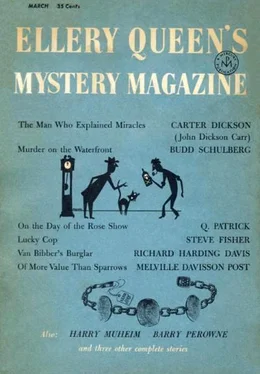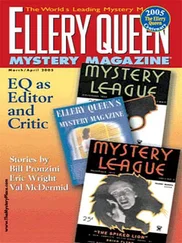Stanley Anton - Ellery Queen’s Mystery Magazine. Vol. 27, No. 3. Whole No. 148, March 1956
Здесь есть возможность читать онлайн «Stanley Anton - Ellery Queen’s Mystery Magazine. Vol. 27, No. 3. Whole No. 148, March 1956» весь текст электронной книги совершенно бесплатно (целиком полную версию без сокращений). В некоторых случаях можно слушать аудио, скачать через торрент в формате fb2 и присутствует краткое содержание. Город: New York, Год выпуска: 1956, Издательство: Mercury Publications, Жанр: Детектив, на английском языке. Описание произведения, (предисловие) а так же отзывы посетителей доступны на портале библиотеки ЛибКат.
- Название:Ellery Queen’s Mystery Magazine. Vol. 27, No. 3. Whole No. 148, March 1956
- Автор:
- Издательство:Mercury Publications
- Жанр:
- Год:1956
- Город:New York
- ISBN:нет данных
- Рейтинг книги:5 / 5. Голосов: 1
-
Избранное:Добавить в избранное
- Отзывы:
-
Ваша оценка:
- 100
- 1
- 2
- 3
- 4
- 5
Ellery Queen’s Mystery Magazine. Vol. 27, No. 3. Whole No. 148, March 1956: краткое содержание, описание и аннотация
Предлагаем к чтению аннотацию, описание, краткое содержание или предисловие (зависит от того, что написал сам автор книги «Ellery Queen’s Mystery Magazine. Vol. 27, No. 3. Whole No. 148, March 1956»). Если вы не нашли необходимую информацию о книге — напишите в комментариях, мы постараемся отыскать её.
Ellery Queen’s Mystery Magazine. Vol. 27, No. 3. Whole No. 148, March 1956 — читать онлайн бесплатно полную книгу (весь текст) целиком
Ниже представлен текст книги, разбитый по страницам. Система сохранения места последней прочитанной страницы, позволяет с удобством читать онлайн бесплатно книгу «Ellery Queen’s Mystery Magazine. Vol. 27, No. 3. Whole No. 148, March 1956», без необходимости каждый раз заново искать на чём Вы остановились. Поставьте закладку, и сможете в любой момент перейти на страницу, на которой закончили чтение.
Интервал:
Закладка:
Ellery Queen’s Mystery Magazine. Vol. 27, No. 3. Whole No. 148, March 1956

The Man Who Explained Miracles
by Carter Dickson (John Dickson Carr)
A red-carpet, ticker-tape, snowstorm-of-confetti welcome — a 17-gun salute complete with ruffles, flourishes, and appropriate music — to Sir Henry Merrivale (H.M.) and his triumphant return to the pages of EQMM — welcome home!
Yes, a thunderous hip, hip to the irascible, outrageous Old Man, to the bellowin’, glarin’, burn-me, Lord love-a-duck Old Maestro in all his gumshoe glory... and to the author’s famous specialty, but this time in spades — not one locked room but two in the same story!
Here is Carter Dickson s (John Dickson Carr’s) newest novelette — a tale of terror set against the “commonplaces” of London and Hampton Court Palace... and do not, we implore you, beware of the love story: it is — in the classic Dickson-Carr technique — a fully integrated and dovetailed part of the tale.
So again — welcome back to that growlin’, roarin’ old sinner, all sixteen-stone of him — the great H.M., created by one of the genuine Old Pros and New Masters of “the grandest game in the world.”
When Tom Lockwood first saw her, she was running down the stairs in terror. Behind her stretched the great sweep of stairs up to the portico of St. Paul’s; above, Paul’s Dome almost shut out the gray spring sky. A pigeon fluttered its wings. But there were very few people to see what happened.
The girl glanced over her shoulder. She was still so badly frightened that Tom’s first thought was instinctive: she might stumble and pitch headlong. So he ran towards her.
His next thought, born of his journalistic work, was the grotesqueness of this whole scene, as the bell boomed out the stroke of four: a very pretty girl, with dark hair and wide-spaced gray eyes, fleeing in blind panic from the House of God.
Then she did stumble.
Tom caught her before she fell, and lifted her up gently by the elbows.
“Steady does it, you know,” he said, and smiled down at her. “There’s nothing to be afraid of, really.”
Instantly she recoiled; then she saw his expression, and hesitated. Tom Lockwood’s own mother could not have called him handsome. But he had such an engaging and easy-going expression, especially in his smile, that almost any woman would have trusted him on sight — and would have been right.
“Nothing to be afraid of,” he repeated.
“Isn’t there?” the girl blurted out. “When last night, by some miracle no one can understand, they try to kill me? And now, just now, a voice speaks where no voice could have spoken? And tells me again I am going to die?”
Taxis hooted up Ludgate Hill. A rather sinister-looking policeman stood at the left-hand side of St. Paul’s Churchyard. Tom had a topsy-turvy sense that he did not really hear the words she was speaking.
She spoke with passion, in a beautiful voice with — was it? — some very faint tinge accent. Her hair really was black and shining, worn in a long bob; the gray eyes, their pupils dilated with fear, had long black lashes. Tom was so conscious of her physical presence that he hastily let go her elbows.
“You don’t believe me!” she cried. “Very well! I must go.”
“No! Wait!”
The girl hesitated, looking at the pavement.
And Tom Lockwood was inspired almost to eloquence.
“You’re alone,” he said. “Oh, there may have been people with you in the Cathedral! But you’re alone in yourself; you feel lost; you don’t trust anybody. Will you trust a perfect stranger, if I tell you I only want to help you?”
To his intense embarrassment, tears came into her eyes.
“What you need—” he began. It was on the tip of his tongue to say “a couple of whiskies,” but, in his present exalted mood, he decided this was unromantic. “Across the road,” he said, “there’s a tea shop of sorts. What you need is to drink tea and tell me your troubles. After all, hang it, I’m a reasonably respectable bloke! You see that policeman over there?”
“Yes?”
“He knows me,” said Tom. “No, no, not because I’m an old lag just out of jail! As a matter of fact, I’m a crime reporter for the Daily Record. Here’s my press-card.”
“You are journalist?”
Her eyes flashed up; she pronounced the word almost as journaliste.
“Not where you are concerned. Please believe that! And you — are you by any chance French?”
“I am English,” she retorted proudly, and drew herself up to her full height of five feet one. “Ah, bah! I am named Jenny. Jenny Holden. That is English enough, surely?”
“Of course. And I’m Tom Lockwood.”
“But, you see,” Jenny continued, “I have lived most of my life in France. When they brought me here for a visit, things seemed all funny but very nice, until—”
Jenny glanced back over her shoulder. Fear struck again, as though some terrifying presence lurked inside the Cathedral.
“Mr. Lockwood,” she said, “of course I will go with you. And we need not be introduced by a policeman.” Then her passionate voice rose. “But let us hurry, hurry, hurry!”
They dodged across through the skittish traffic to the tea shop at the corner of Paternoster Row. They passed the policeman in question, who seemed to fascinate Jenny. He was one of the Old Brigade: bulky and almost seven feet tall, just what any foreign visitor would expect to see.
Tom waved at him by way of greeting. The law saluted gravely but, when Jenny’s head turned away, gave her companion a wink of such outrageous knowingness that Tom’s ears went red.
At the door of the tea shop, however, Tom hesitated and turned round.
“Stop a bit! Was there somebody with you at St. Paul’s?”
“Yes, yes! My Aunt Hester and my Cousin Margot.”
“They didn’t frighten you?”
“No, of course not!” Jenny’s lips became mutinous. “I do not like my Aunt Hester. She behaves like a duchess, with a lorgnette, and you can hear her talking all over a restaurant. You know what I mean?”
“Bitterly well.”
“My Cousin Margot, she is young and I like her. But I wish to get away from them. Please!”
“Right,” said Tom, opening the door. “In you go.”
He allowed the door to close very briefly behind her so that she should not hear him when his voice carried clearly across to the policeman.
“Dawson! You haven’t seen us. Understand?”
The law did. His wink was more portentous than ever.
In the tea shop, more properly a tea bar, two girls chattered and banged tins behind the counter. But the place was deserted, including the two booths at the back. When the newcomers sat opposite each other in the farther booth, over thick mugs of a beverage which was at least hot, Jenny’s terror was decreasing. She accepted a cigarette, had it lighted for her, and hesitated. Then she burst out: “You see, it is so difficult to say! I don’t wish you to think I am silly, or have fancies, or am off my head. That is what they think.”
“ ‘They’?”
“Aunt Hester. And others.”
“Aunt Hester,” said Tom, “shall be hung out on the clothes-line, preferably upside down, at the first opportunity. Meanwhile...”
He broke off, because Jenny bubbled with that laughter he came to know so well.
“You are nice!” she declared, like a magistrate imposing sentence. “Oh, how it is pleasant to meet people who make you laugh! Instead of—”
Читать дальшеИнтервал:
Закладка:
Похожие книги на «Ellery Queen’s Mystery Magazine. Vol. 27, No. 3. Whole No. 148, March 1956»
Представляем Вашему вниманию похожие книги на «Ellery Queen’s Mystery Magazine. Vol. 27, No. 3. Whole No. 148, March 1956» списком для выбора. Мы отобрали схожую по названию и смыслу литературу в надежде предоставить читателям больше вариантов отыскать новые, интересные, ещё непрочитанные произведения.
Обсуждение, отзывы о книге «Ellery Queen’s Mystery Magazine. Vol. 27, No. 3. Whole No. 148, March 1956» и просто собственные мнения читателей. Оставьте ваши комментарии, напишите, что Вы думаете о произведении, его смысле или главных героях. Укажите что конкретно понравилось, а что нет, и почему Вы так считаете.












